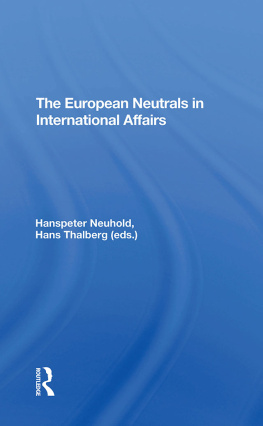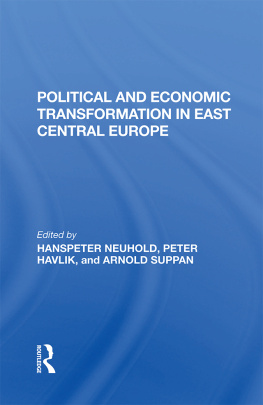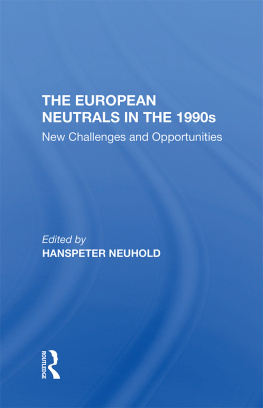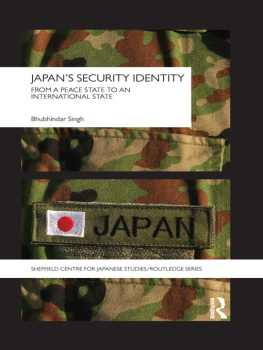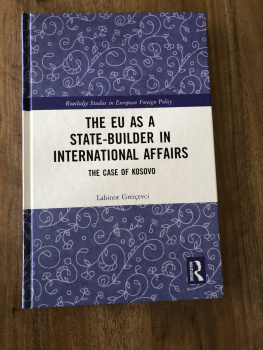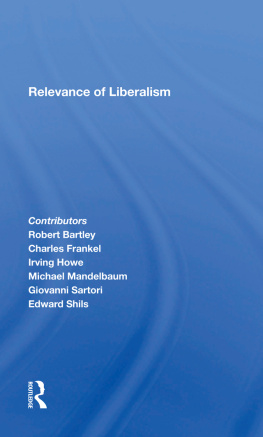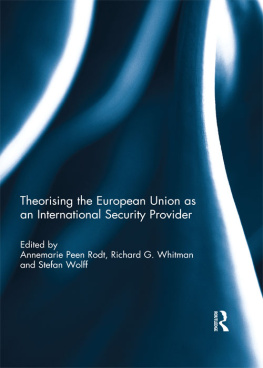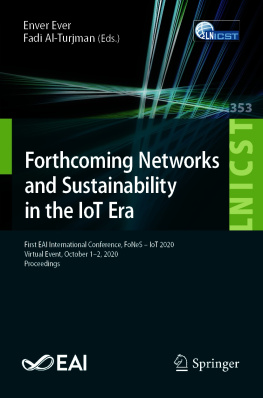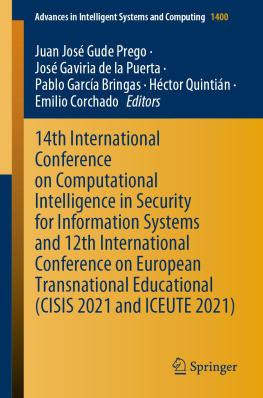First published 1984 by Westview Press, Inc.
Published 2019 by Routledge
52 Vanderbilt Avenue, New York, NY 10017
2 Park Square, Milton Park, Abingdon, Oxon OX14 4RN
Routledge is an imprint of the Taylor & Francis Group, an informa business
Copyright 1984 by Wilhelm Braumiiller, Universitilts-Verlagsbuchhandlung Gesellschaft m. b. H., A-1092 Wien
All rights reserved. No part of this book may be reprinted or reproduced or utilised in any form or by any electronic, mechanical, or other means, now known or hereafter invented, including photocopying and recording, or in any information storage or retrieval system, without permission in writing from the publishers.
Notice:
Product or corporate names may be trademarks or registered trademarks, and are used only for identification and explanation without intent to infringe.
CIP-Kurztitelaufnahme der Deutschen Bibliothek
The European neutrals in international affairs/ Hanspeter Neuhold; Hans Thalberg
(eds.). Wien: Braumller, 1984.
(The Laxenburg Papers; 7)
ISBN 3-7003-0609-1
NE: Neuhold, Hanspeter [Hrsg.]; GT
ISBN 13: 978-0-367-29187-7 (hbk)
A conference, organized by the Austrian Institute for International Affairs and dealing with the topic "In Search of Peace and Security: The Role of the European Neutrals", was held at Schlo Laxenburg on 27 and 28 October 1983.
Three years earlier, on the occasion of the 25th anniversary of the establishment of Austria's permanent neutrality, the Institute had conducted a seminar on "Neutrality and Non-Alignment in Europe". The papers presented in 1980 were published as Laxenburg Paper no. 4 and served as the basis for the 1983 follow-up conference.
Whereas the main purpose then had been a comparison of various historic, political, legal, economic and military aspects of the neutral status of Austria, Finland, Sweden and Switzerland, and of the non-alignment of Yugoslavia, the conference in 1983 focused on two more specific topics.
On the one hand, scholars from the four neutral States of Europe dealt with what they regarded as their countries' main contributions to international peace and security, both on the European continent and at a global level. On the other hand, experts from selected non-neutral countries (Hungary, the Netherlands, Norway, the USA, the USSR and Yugoslavia) were invited to assess, in the eyes of their governments, of public opinion and in the literature on International Relations, the record of those four neutrals in the performance of the tasks for which they feel particularly qualified as a result of their neutral position. It was tempting indeed to ascertain whether the images which the governments and citizens of neutral States have of their countries' role in international relations are shared by others.
Not surprisingly, Austrian, Finnish, Swedish and the Swiss representatives emphasized different functions in the neutrality policies of their countries, given the historic, geostrategic, military and other differences among them. Yet, especially in the discussions following the presentations, common denominators were also stressed, above all the shift from (permanent) neutrality as a defensive strategy to keep States out of war to active efforts in peacetime to prevent and reduce international tension and a recent trend towards multilateral cooperation among non-bloc members, in particular within the framework of CSCE.
The divergent evaluations of neutrality by analysts from States belonging to military alliances or from a member of the non-aligned movement did not come as a surprise. The European neutrals must find the generally positive attitude towards their exceptional status among neighboring countries reassuring. They cannot but regret a certain "benign neglect", a lack of understanding of the functions which they can and which they can not fulfil, in other States, first and foremost among politicians and opinion leaders of the two Superpowers.
The authors were asked to update and revise their papers, if necessary, in the light of the debates at Schlo Laxenburg last year. In this volume the papers are presented in the order in which they were given last October. As Dr. Victor Kremenyuk had to cancel his participation literally almost at the last minute, Dr. Nicolai Polianow kindly agreed to state a Soviet point of view, which focused, however, only on Austria's permanent neutrality. Hence we decided to include Dr. Kremenyuk's more comprehensive paper, although it could not be discussed at the conference. Moreover, we felt that a summary of the main ideas expressed by the conference participants should be attempted. We therefore added a final chapter evaluating the results of the conference.
Thanks are due to the Nordic Cooperation Committee for International Politics, Stockholm, to the Klber-Stiftung, Sarnen, and to the Embassy of the United States in Vienna for financial support to cover travel expenses of participants from their respective countries.
Finally, we want to thank the International Institute for Applied Systems Analysis for its generous hospitality during the conference and Mr. David Beal for his assistance in editing the papers. We hope that this second Laxenburg Paper on neutrality willhowever modestlyincrease interest in and understanding of a rather exceptional international status, from which not only the States endowed with it but others can benefit as well.
Pierre du Bois
Institut Universitaire d'tudes Europennes, Geneva
1. Introduction
There can be no Swiss foreign policy without good offices. Since the second half of the nineteenth century, Switzerland has considered its neutrality not only as the basis of its foreign policy but also as a "schedule of obligations" translated into a concept of active solidarity, particularly in the case of international conflict or controversy. For what is at stake is the credibility of neutrality abroad, especially with neighbor States. What would be the sense of neutrality without the advantages which it also bestows upon the international community?
Active neutrality implies diverse services which are the manifestation of the Swiss desire for solidarity. As Mr. Max Petitpierre, the former Swiss Minister for Foreign Affairs, declared in 1953, after the Federal Council had accepted to participate in the Neutral Nations Repatriation Commission in Korea and in the Neutral Nations Supervisory Commission, "Absolute and permanent neutrality, as we conceive and want it, is not defensible merely as abstention and passivity. It sometimes requires, if it is to be recognized and respected, the support of an action wich justifies it. Neutrality is an obligation .
One of the responsibilities that neutrality implies is that of good offices. Whereas, in terms of public international law, good offices mean an action undertaken by a third State, an international organization or even a single citizen in order to procure a settlement between conflicting countries, in Switzerland this traditional legal concept is extended to include a wide range of activities which aims at bridging the gap in international controversies, at smoothing out difficulties resulting therefrom, at peacefully settling differences, or at least at alleviating conflicts, and in a more general way at helping to maintain peace among nations. It designates actions which are destined to somehow limit either other conflicts or differences between States or between States and national liberation movements.


